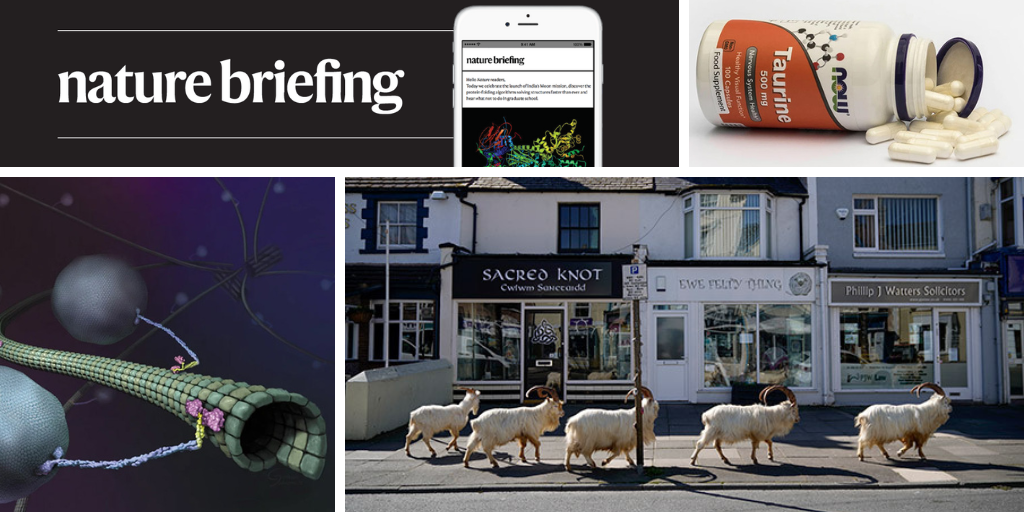Hello Nature readers, would you like to get this Briefing in your inbox free every day? Sign up here.

Wild mountain goats roamed the streets of Llandudno, Wales, in 2020. (Christopher Furlong/Getty Images)
COVID-19 lockdowns offered a natural experiment to find out why animals usually tend to avoid roads — is it because of the vehicles, or the infrastructure? Tracking data from 43 mammal species around the world showed that most animals explored more of the landscape when vehicle movement was limited. In cities, the effect was reversed: animals roamed less widely, maybe because they were less often frightened by cars.
Feeding large amounts of taurine — a common ingredient in energy drinks — to mice, worms and monkeys helps them to live longer, healthier lives. When researchers gave taurine supplements to mice, their lifespans increased by around 10% compared with a control group. They also seemed healthier, with improvements in muscle endurance and strength. Similar effects on the hallmarks of ageing were seen in Caenorhabditis elegans worms and middle-aged rhesus monkeys (Macaca mulatta). Scientists urge caution for people looking to boost their own health — it’s too soon to say whether the findings translate to humans.
Scientists are spending millions of dollars’ worth of time reformatting rejected papers for submission to alternative journals. An analysis shows that, in 2021, the global price tag on all of that busywork was US$230 million — just for biomedical journals. If current journal practices don’t change, the authors estimate that reformatting could cost about $2.5 billion between 2022 and 2030. Suggested remedies include universal journal guidelines, free-format submissions or a ‘golden middle’ solution that allows researchers to submit manuscripts that abide by minimal structural requirements, such as total word count. “The current system is not sustainable,” says study co-author Tibor Varga.
Reference: BMC Medicine paper
Features & opinion
A super-resolution microscope called MINFLUX can track moving motor proteins even amid the bustle of living cells. Kinesin, which looks like a twisted stalk wearing oversized shoes, is one of those molecular motors that drive crucial processes, including cell division, signalling and transport. Observing kinesin in its natural cellular habitat is tricky because it walks so fast. MINFLUX builds on the success of stimulated emission depletion microscopy, a Nobel-prizewinning method that bypasses the diffraction limit of light microscopy. With its doughnut-shaped laser, MINFLUX can track kinesin even when it’s running at 550 nanometres per second. “It’s really a tour de force,” says biomedical engineer William Hancock.
The thorny questions that plague physicists get a simple answer in the latest short story for Nature’s Futures series.
Andrew Robinson’s pick of the top five science books to read this week includes a vivid biography of Christiane Desroches Noblecourt, an egyptologist who was one of the first women to lead a dig, and a powerful analysis of why everyone is susceptible to misinformation.
A brain circuit that controls infanticidal behaviour has been identified in mice. It’s not unusual for virgin female mice to kill pups produced by other females, but this behaviour disappears when they become mothers themselves. The switch from killing to caring shows that the circuits are two sides of the same coin, says neuroscientist Dayu Lin. “While we suppress the hostile circuit, we actually improved maternal behaviours at the same time,” she tells the Nature Podcast. The brain region that drives infanticide in mice is present across vertebrate species, including in humans.
Nature Podcast | 32 min listen
Subscribe to the Nature Podcast on Apple Podcasts, Google Podcasts or Spotify.







More News
Author Correction: Stepwise activation of a metabotropic glutamate receptor – Nature
Changing rainforest to plantations shifts tropical food webs
Streamlined skull helps foxes take a nosedive